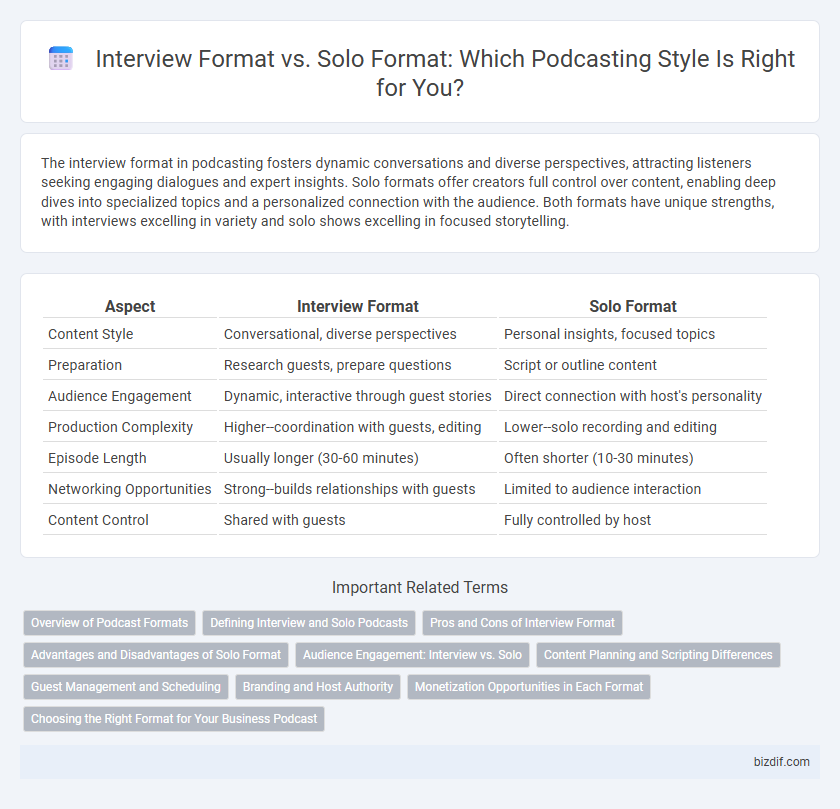The interview format in podcasting fosters dynamic conversations and diverse perspectives, attracting listeners seeking engaging dialogues and expert insights. Solo formats offer creators full control over content, enabling deep dives into specialized topics and a personalized connection with the audience. Both formats have unique strengths, with interviews excelling in variety and solo shows excelling in focused storytelling.
Table of Comparison
| Aspect | Interview Format | Solo Format |
|---|---|---|
| Content Style | Conversational, diverse perspectives | Personal insights, focused topics |
| Preparation | Research guests, prepare questions | Script or outline content |
| Audience Engagement | Dynamic, interactive through guest stories | Direct connection with host's personality |
| Production Complexity | Higher--coordination with guests, editing | Lower--solo recording and editing |
| Episode Length | Usually longer (30-60 minutes) | Often shorter (10-30 minutes) |
| Networking Opportunities | Strong--builds relationships with guests | Limited to audience interaction |
| Content Control | Shared with guests | Fully controlled by host |
Overview of Podcast Formats
Interview formats in podcasting feature dynamic conversations between hosts and guests, providing diverse perspectives and expert insights that engage listeners deeply. Solo formats offer a direct connection with the audience, allowing hosts to deliver focused content, personal stories, or expert knowledge without interruption. Both formats cater to different listener preferences and content goals, making them essential structures in the podcasting landscape.
Defining Interview and Solo Podcasts
Interview podcasts feature a host engaging with one or more guests to explore diverse perspectives, creating dynamic and conversational content. Solo podcasts involve a single host sharing insights, stories, or expertise directly with the audience, offering a focused and personal listening experience. Both formats serve distinct purposes in podcasting, catering to different audience preferences and content goals.
Pros and Cons of Interview Format
The interview format in podcasting offers dynamic content through diverse perspectives and expert insights, enhancing audience engagement and credibility. However, it requires more logistical planning, including scheduling guests and managing conversations, which can lead to inconsistent episode flow. Technical challenges like audio quality and time constraints may also affect the overall production value compared to solo formats.
Advantages and Disadvantages of Solo Format
The solo podcast format offers complete creative control and flexibility, allowing hosts to develop content tailored precisely to their vision without scheduling conflicts or dependence on guests. It fosters a direct connection with the audience, potentially enhancing listener loyalty through consistent voice and perspective. However, solo episodes may lack diverse viewpoints and dynamic conversations, which can reduce engagement and place the entire responsibility for content quality and pacing on the host.
Audience Engagement: Interview vs. Solo
Interview format podcasts boost audience engagement by introducing diverse perspectives and dynamic conversations that keep listeners intrigued. Solo format allows hosts to establish personal connections, showcasing expertise and fostering loyal, consistent audiences. Both formats rely on authentic storytelling and listener interaction to maximize engagement and retention.
Content Planning and Scripting Differences
Interview format podcasts require extensive pre-interview research and tailored question development to ensure dynamic and engaging conversations, often necessitating flexible scripting to accommodate guest responses. Solo format podcasts rely heavily on detailed content planning and structured scripting to maintain listener interest and convey clear, concise messages without external interaction. Effective content planning in both formats involves balancing spontaneity with preparation to deliver cohesive and compelling episodes.
Guest Management and Scheduling
Interview format podcasting demands meticulous guest management and scheduling to coordinate availability and prepare customized questions, enhancing content relevance and listener engagement. Solo format offers greater flexibility by eliminating guest coordination, allowing hosts to create episodes on their own timeline without logistical constraints. Efficient scheduling tools and communication platforms streamline the interview process, ensuring timely recordings and professional guest experiences.
Branding and Host Authority
The interview format enhances branding by associating the host with expert guests, boosting credibility and expanding audience reach through star power. Solo episodes build host authority by showcasing personal expertise and consistent voice, fostering deeper listener trust and loyalty. Balancing both formats strategically strengthens overall podcast identity and positions the host as a thought leader in their niche.
Monetization Opportunities in Each Format
Interview podcast formats offer diverse monetization opportunities through sponsorships, branded content, and audience engagement due to the dynamic exchange between hosts and guests. Solo podcast formats rely heavily on loyal listener support, including listener donations, premium content subscriptions, and direct merchandise sales, fostering a personal connection that can drive consistent revenue. Both formats can leverage targeted advertising, but interviews typically attract broader audience demographics, increasing potential advertiser interest.
Choosing the Right Format for Your Business Podcast
Choosing the right podcast format depends on your business goals and audience preferences. Interview formats provide diverse perspectives and expert insights, fostering engagement and credibility, while solo formats showcase your personal expertise and brand personality, allowing for greater content control. Analyze your content strategy, resource availability, and listener expectations to determine whether interviews or solo episodes will better support your podcast's growth and business objectives.
Interview format vs solo format Infographic

 bizdif.com
bizdif.com